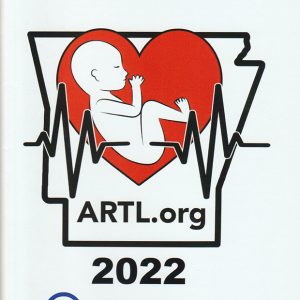calsfoundation@cals.org
Arkansas Right to Life
Arkansas Right to Life is a nonprofit organization whose stated purpose is to “educate through the presentation of detailed and factual information about fetal development, abortion, alternatives to abortion, infanticide, euthanasia, and related issues, upon which individuals and the general public may make informed decisions.” The organization is mainly known for its stance against abortion, but members also actively oppose stem-cell research, euthanasia, and assisted suicide.
Arkansas Right to Life is a state affiliate of National Right to Life, which was founded in 1968. The Arkansas chapter was officially incorporated as a nonprofit public organization in 1974, the year after the Roe v. Wade U.S. Supreme Court decision, which legalized abortion in the United States. National Right to Life and its state chapters are not affiliated with any particular political party or religious denomination.
Arkansas Right to Life has had a booth at the Arkansas State Fair every year since 1977. Thousands of fair attendees visit the booth every year. In 1978, Arkansas Right to Life also began sponsoring the Arkansas March for Life held every January in Little Rock (Pulaski County) on the anniversary of the Roe v. Wade decision.
Arkansas Right to Life also leads the Crosses for Life Memorial. The Benton County chapter began the project as an outreach program, but it later became statewide. Hosted by churches around the state, the Crosses for Life Memorial is a display of 4,000 white crosses representing the average number of fetuses legally aborted each day.
In 2003, Arkansas made available specialized license plates displaying the phrase “Choose Life.” The plate costs an extra thirty-five dollars per renewal, the majority of which is donated to pro-adoption funds. Arkansas Right to Life was a supporter of this initiative.
Arkansas Right to Life has taken political action on the issue of abortion. The Arkansas Right to Life Political Action Committee (ARTL PAC) is a non-partisan committee that supports specific candidates in public office. The organization’s website lists current endorsements, displays information about abortion-related bills have been recently introduced, and shows how Arkansas’s senators and representatives voted on relevant bills.
Various bills have been brought before the Arkansas General Assembly that would limit legal abortions in the state. In 2011, SB113 would have prohibited abortion to be covered by companies participating in the Affordable Care Act; the bill passed in the state Senate but not in the House. HB1887 would have banned all abortions at twenty weeks of pregnancy and later, under the premise that this is the point at which a fetus can feel pain, but this bill failed in 2011. HB1855, which requires clinics that perform more than ten abortions a month to be licensed, was passed in April 2011. Arkansas Right to Life played a major part in sponsoring and publicizing these bills.
In May 2015, Arkansas Right to Life stated that its next legislative goal is to ban the dilation and extraction procedure, which is commonly used to abort fetuses past the first trimester—a method described by anti-abortion activists as “dismemberment abortions.”
For additional information:
Arkansas Right to Life. http://www.artl.org/ (accessed November 26, 2025).
Peacock, Leslie Newell. “Putting the Fetus First.” Arkansas Times, June 22, 2011. Online at http://www.arktimes.com/arkansas/putting-the-fetus-first/Content?oid=1825590 (accessed November 26, 2025).
Anastasia Teske
North Little Rock, Arkansas








Comments
No comments on this entry yet.